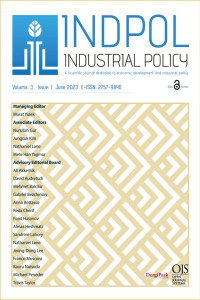Abstract
Project Number
BAP-39970
References
- Aumann, R. J. and Maschler, M. (1985). Game theoretic analysis of a bankruptcy problem from the Talmud. Journal of Economic Theory, 36(2), 195–213. https://doi.org/10.1016/0022-0531(85)90102-4
- Curiel, I. J., Maschler, M. & Tijs, S. H. (1987). Bankruptcy games. Zeitschrift Für Operations Research, 31, A143–A159. https://doi.org/10.1007/BF02109593
- Dagan, N. (1996). New characterizations of old bankruptcy rules. Social Choice and Welfare, 13(1), 51–59. http://www.jstor.org/stable/41106151
- Dagan, N. and Volij, O. (1993). The bankruptcy problem: A cooperative bargaining approach. Mathematical Social Sciences, 26(3), 287–297. https://doi.org/10.1016/0165-4896(93)90024-D
- Moulin, H. (1987). Equal or proportional division of a surplus, and other methods. International Journal of Game Theory, 16, 161-186. https://doi.org/10.1007/BF01756289
- Moulin, H. (2000). Priority rules and other asymmetric rationing methods. Econometrica, 68(3), 643–684. https://doi.org/10.1111/1468-0262.00126,
- Moulin, H. (2002). Axiomatic cost and surplus sharing. Handbook of Social Choice and Welfare, 1, 289–357. https://doi.org/10.1016/S1574-0110(02)80010-8
- O’Neill, B. (1982). A problem of rights arbitration from the Talmud. Mathematical Social Sciences, 2(4), 345–371. https://doi.org/10.1016/0165-4896(82)90029-4
- Rabinovitch, N. L. (1973). Probability and statistical inference in ancient and medieval Jewish literature. Toronto, Canada: University of Toronto Press.
- Thomson, W. (2019). How to divide when there isn't enough. Cambridge, UK: Cambridge University Press. Young, H. P. (1987). On dividing an amount according to individual claims or liabilities. Mathematics of Operations Research, 12(3):398–414
- Young, H. P. (1988). Distributive justice in taxation. Journal of Economic Theory, 44(2), 321–335. https://doi.org/10.1016/0022-0531(88)90007-5
- Young, H. P. (1990). Progressive taxation and equal sacrifice. The American Economic Review, 80(1), 253–266. http://www.jstor.org/stable/2006747
Abstract
This paper studies the fair division of a scarce resource among competing claimants, a problem commonly referred to as the claims problem in the literature. This model has numerous practical applications, ranging from estate division and rationing to bankruptcy and even fundamental taxation issues. An axiomatic approach is utilized to scrutinize the properties of division rules, which are represented as mathematical axioms. The paper offers an analysis of prominent division rules, such as the proportional and egalitarian rules, alongside their axiomatic characterizations. Ultimately, the paper presents a comprehensive framework for achieving a fair and equitable allocation of scarce resources among competing claimants.
Supporting Institution
İstanbul Teknik Üniversitesi
Project Number
BAP-39970
Thanks
The author acknowledges financial support from Istanbul Technical University (BAP–39970).
References
- Aumann, R. J. and Maschler, M. (1985). Game theoretic analysis of a bankruptcy problem from the Talmud. Journal of Economic Theory, 36(2), 195–213. https://doi.org/10.1016/0022-0531(85)90102-4
- Curiel, I. J., Maschler, M. & Tijs, S. H. (1987). Bankruptcy games. Zeitschrift Für Operations Research, 31, A143–A159. https://doi.org/10.1007/BF02109593
- Dagan, N. (1996). New characterizations of old bankruptcy rules. Social Choice and Welfare, 13(1), 51–59. http://www.jstor.org/stable/41106151
- Dagan, N. and Volij, O. (1993). The bankruptcy problem: A cooperative bargaining approach. Mathematical Social Sciences, 26(3), 287–297. https://doi.org/10.1016/0165-4896(93)90024-D
- Moulin, H. (1987). Equal or proportional division of a surplus, and other methods. International Journal of Game Theory, 16, 161-186. https://doi.org/10.1007/BF01756289
- Moulin, H. (2000). Priority rules and other asymmetric rationing methods. Econometrica, 68(3), 643–684. https://doi.org/10.1111/1468-0262.00126,
- Moulin, H. (2002). Axiomatic cost and surplus sharing. Handbook of Social Choice and Welfare, 1, 289–357. https://doi.org/10.1016/S1574-0110(02)80010-8
- O’Neill, B. (1982). A problem of rights arbitration from the Talmud. Mathematical Social Sciences, 2(4), 345–371. https://doi.org/10.1016/0165-4896(82)90029-4
- Rabinovitch, N. L. (1973). Probability and statistical inference in ancient and medieval Jewish literature. Toronto, Canada: University of Toronto Press.
- Thomson, W. (2019). How to divide when there isn't enough. Cambridge, UK: Cambridge University Press. Young, H. P. (1987). On dividing an amount according to individual claims or liabilities. Mathematics of Operations Research, 12(3):398–414
- Young, H. P. (1988). Distributive justice in taxation. Journal of Economic Theory, 44(2), 321–335. https://doi.org/10.1016/0022-0531(88)90007-5
- Young, H. P. (1990). Progressive taxation and equal sacrifice. The American Economic Review, 80(1), 253–266. http://www.jstor.org/stable/2006747
Details
| Primary Language | English |
|---|---|
| Subjects | Microeconomics (Other) |
| Journal Section | Research Articles |
| Authors | |
| Project Number | BAP-39970 |
| Early Pub Date | July 28, 2023 |
| Publication Date | July 28, 2023 |
| Published in Issue | Year 2023 Volume: 3 Issue: 1 |


